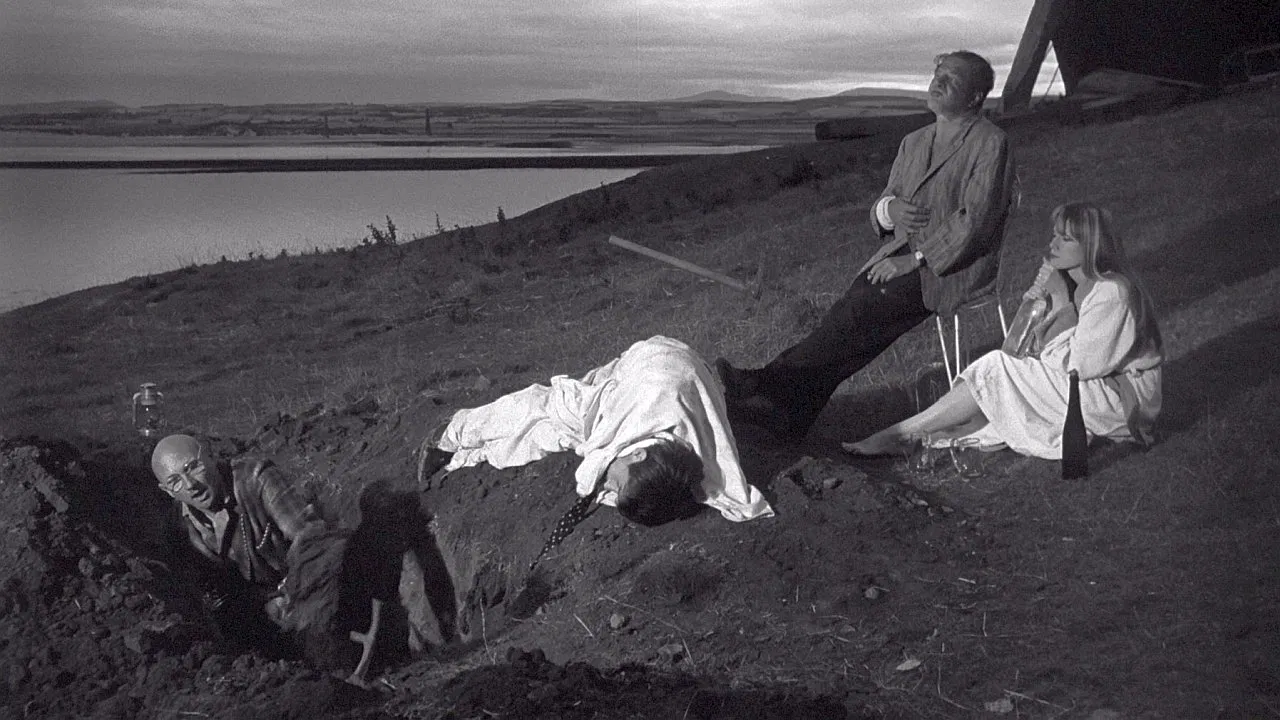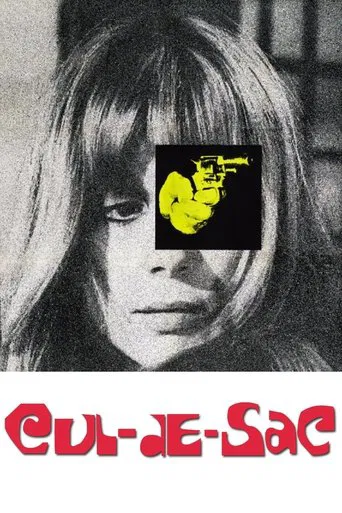

I could totally identify with the characters in this film. Especially the one played by Donald Pleasance. He plays one of the most pathetic characters in the history of cinema. When the villain (a gangster on the run) first meets Pleasance, he has make up and a nightie on. It is all downhill for him after that. I saw the film as being about people who are hiding from the world. But the cruel and evil outside world keeps coming for them. There is no stopping the outside world from coming for a pathetic person like George (Pleasance). Even if you live on a remote island. Even his girlfriend (the beautiful Francoise Dorleac) gets a kick out of humiliating him. Some of the scenes in the film, like when Pleasance and his girlfriend try to suck up-to the gangster are funny but also reveal so much about human nature. Polanski knows so much about mankind and human nature. He is not someone to be taken lightly. Nor should he be locked up in jail. I hope he makes many more movies.Polanski seems to have a thing for films of place. The Fearless Vampire Killers and Ghost Writer were films of place. So is Cul De Sac. The film can be enjoyed for its location alone. The deserted island with the large villa at the top and the water that comes in during the high tide all make for some spectacular visuals.
... View MoreRoman Polanski and his screenwriter in this film, Gerard Brach, were said to be enamored of theater of the absurd during their sojourn in Paris in the mid-60s, and wished to make a cinematic version of the then prevailing absurdist drama. It's been reported that they asked Samuel Becket, of "Waiting for Godot" fame, if they could film one of his absurdist dramas, particularly Godot, but he refused saying that his plays were meant for the stage, and only the stage. So Brach and Polanski decided to write their own absurdist film script and wrote "Cul-De-Sac" while in France, but could find no financial backing which they later sought in England. Financial support was also difficult to find in England but their success with Repulsion (1965), a psychological-horror film, made financing available for Cul-De-Sac, which was the film they wanted to make all along. In an interview in 1970 (before Chinatown), Polanski called it "my best film. I always loved it. I always believed in it. It is real cinema." What it is is "absurdist" cinema that simultaneously, and not separately, combines melodrama and comedy, where two dim-witted, small-time gangsters confront a sadomasochistic couple in a Gothic, horror-like setting. The two criminals, trying to get away from a job they botched for the mysterious Mr. Katelbach, lose their auto on the causeway to a medieval castle on a island just off the Northumberland coast in England, and as the tide comes in, they find themselves trapped on the island with the couple who live in the foreboding castle, or rather the couple finds themselves trapped with the hoods. And so begins the wait for the rescue by Ketelbach who is sure to turn up and rescue these dim-wits from the authorities who are surely on their tail. The owner, George, is older than his wife, somewhat effete and scared, and scorned by his wife, who's sexually flirtatious; the two hoods have been shot, one is dying, and the other (Dickie) uses towels as a bandage and becomes increasingly abusive, albeit in a comical way. The actions and dialogue of the four often make no sense, but there's some macabre humor when the castle receives visitors and the couple, afraid of revealing Dickie to be who he is, use him as their butler, but the rough hood's manners, movements, and speech indicate he's never worked at Downton Abbey. In the end, one of the characters dies, one is shot, one goes crazy, and one goes off with an apparent new lover, but has Ketelbach shown up?Technically, this is a well-shot film, as you might expect from a Polanski film, but I don't believe absurdist drama is perfectly made for film. I believe absurdist drama is more suitable for the stage where dialogue is everything, but I'm sure some readers can cite examples that can refute my assertion. In any event, the weird humor might have been more compelling in the 1960s than I found it in 2015.
... View MoreI favor dark comedies bordering on the surreal & Polanski does best. Well deserved kudos from Berlin, which I managed to see shortly thereafter in Philadelphia's wonderful Bandbox Theater which was almost empty, IMSMC. I have seen it once again since years ago in Boston & was delighted to see MGM's digital version on cable, which seems an excellent reproduction. Some of the other reviews here sorely missed the point. The setting is Lindisfarne, a holy island in northern England. Ms. Bisset has a line, which is one of my favorites. This is a very dark comedy indeed that was way ahead of its time, which even today confuses many viewers, including some reviewers here. A pity Françoise Dorléac went the James Dean route shortly after filming this, her best role.
... View MoreI was reading some of the messages posted by members who express their regret that they couldn't find the film on DVD here in the UK. Now you can. I bought mine about three years ago, an edition from Odeon Entertainment. Together with "Knife in the water" and "Repulsion" it makes the collector's trilogy of Polanski's pre-Hollywood films, all of them digitally remastered and presented in their original aspect ratio, and accompanied by some interesting behind- the-scenes documentaries and archive interviews with Polanski. Cul-de-Sac was filmed entirely on location in one of the most remote corners of England and a place that seems the product of some fantasy tale -I was there in 2001, drove a hired car from Edinburgh and got to the island during the low tide, a nice experience to remember. The film opens with a view of the long, deserted road. A car in the distance is slowly advancing towards the camera in a rather erratic way. We soon meet the burly, raspy-voiced Dickie(Lionel Stander), who is pushing the car along, and the skinny and ridiculous-looking Albie (Jack MacGowran) sitting at the wheel. We can just figure out they are two crooks on the run after some failed hit, for Albie has been shot in the stomach and Dickie in one arm. The stolen car has run out of petrol and they don't know where they are. Albie is "fed-up" –a line he will repeat now and again throughout the film-, and Dickie then decides to follow the telephone wires,leaving Albie to wait in the car. He almost bumps into a young semi-naked couple idling in the dunes, and avoiding them he next comes to a castle on the shore. He hides in a chicken house and falls asleep. Meanwhile we have met the castle's owners: the weird couple formed by the foolish Donald Pleasance and his frustrated young wife Francoise Dorleac. It is soon clear to us that the relationship between these two is anything but a happy marriage. They don't seem to have any common interests, the whole place is an absolute mess with the chickens roaming all over the house, and Teresa is continuously making fun of George while he acts like a total idiot. Dickie wakes up, enters the house in the dark, helps himself to some milk and makes a phone call to his boss. He is careless about all the noise he makes, and soon the proprietors come downstairs to investigate. He faces them with great cheek and even sense of humour, and George proves to be a coward as he lets himself be bullied by the thug. Teresa stands up to Dickie with loud words and insolence, but he regards her just as a very noisy hen but harmless. He then makes the pair to go help him him to collect Albie back in the beach. Later he gets to speak to his boss, and after being told he will be collected by the gang in the morning he makes himself comfortable, humiliating George now and again while developing a liking for Teresa's nagging at his husband and her absolute lack of fear of Dickie. Albie dies during the night, and they bury him in the grounds. In the morning, rather than Dickie's mates, who arrives,unannounced, are some friends of George instead, getting on the nerves of the three protagonists as they don't know how to get rid of the party now. The nosey, self-inviting guests prove to be a real nuisance. When the hyperactive child shoots with a gun and destroys one of the medieval windows,George throws the clan out of the castle at last. Dusk comes, and Dickie's gang didn't show up at all. He phones his boss again, only to be passed a "fuck off" message from him through a third part. Totally mad and feeling he has been betrayed, he takes George's car to get away, but gets shot and killed by George during a rather pathetic confrontation. One of the afternoon guests then appears; he is coming to pick up the gun he forgot behind earlier. Teresa goes away with him. George, totally cracked-up and now alone in the deserted castle smashes the place, and then ends up running in the beach until he gets closed-up up by the rising tide. At the first viewing one thinks: "And this is it? One hour and three quarters of kinky nonsense with the most stupid people, to come to such idiotic ending? What a total crap". I first saw the film when I was thirteen. I didn't understand it and I actually thought it was idiotic. The second time, many years later and after I had seen a lot of really idiotic crap films, I just loved it: Polanski's stylish direction, those wonderful long takes, the stark black and white cinematography, the musical score, the black humour, the comic relief provided by Albie (how long does it take to die with a belly full of holes, for god's sake??!!...) and the unique setting provided by Lindisfarne. A surrealistic cinematic experience.
... View More